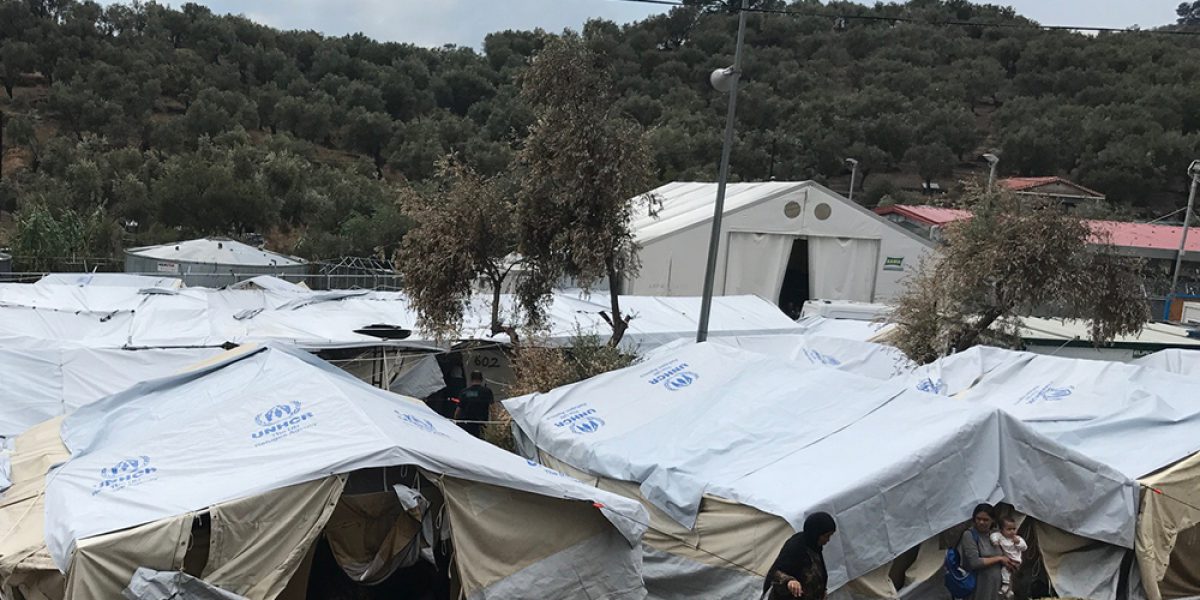Greece: Asylum Seekers in Abysmal Conditions on Islands
23 October 2017

Athens, 23 October 2017 – Prime Minister Alexis Tsipras should end the Greek government’s “containment policy” of confining asylum seekers to the Aegean islands, 19 human rights and humanitarian aid organizations said in an open letter released today.
“We call for urgent action from the Greek authorities in order to prevent more refugees from dying in the cold as winter approaches. People, especially the most vulnerable, should be transferred immediately to the mainland and be offered adequate support,” said JRS Greece advocacy and communications officer, Veronica Paikou.
Thousands of people, including very young children, single or pregnant women, and people with physical disabilities, are trapped in abysmal conditions as winter sets in. Forcing asylum seekers to remain in conditions that violate their rights and are harmful to their well-being, health, and dignity, cannot be justified by the implementation of the EU-Turkey deal, the organizations said.
Since the implementation of the EU-Turkey Statement in March 2016, the Greek islands of Lesbos, Chios, Samos, Kos, and Leros have become places of indefinite confinement. Thousands of women, men, and children are trapped in deplorable and volatile conditions, with many denied access to adequate asylum procedures. Asylum seekers who arrived on the islands in the first days of the implementation of the EU-Turkey Deal have been stuck there for almost 19 months.
The recent increase in arrivals of men, women, and children has increased the pressure on the already overcrowded reception and identification centers known as hotspots. Current arrivals are still comparatively quite low and should be manageable for Greece and the EU more broadly, but they include a significant number of women and children.
The situation is particularly critical on Samos and Lesbos, where a total of more than 8,300 asylum seekers and migrants are living in hotspot facilities meant for just 3,000. The recent announcement that 2,000 asylum seekers will be moved from the two islands to the mainland in the coming weeks as an emergency decongestion measure is a positive development, the groups said. But it is not sufficient to alleviate the current overcrowding of the facilities and does not sustainably address the systemic issues that have created this emergency situation – namely the containment policy.
With the approach of the third winter since large-scale arrivals on the islands began, it is evident that the Greek authorities cannot meet the basic needs and protect the rights of asylum seekers while they remain on the islands. Implementation of the EU-Turkey Statement has been cited by EU and Greek officials as a justification for the containment policy. But forcing asylum seekers to remain in conditions that violate their rights and are harmful to their well-being, health, and dignity, cannot be justified, the organizations said.
The organizations urged Prime Minister Tsipras to protect the human rights of asylum seekers trapped on the islands by ending the containment policy. They should be transferred to the mainland so that they can be provided with adequate accommodation and services to meet their needs and to ensure that their asylum claims are fairly heard.
Press contact:
Veronica Paikou
Advocacy & Communications Officer
JRS Greece
Fylis 68, 10434 Athens, +30 210 823 78 35
The signatories of the letter are:
ActionAid
Advocates Abroad
Aitima
Amnesty International
Care
Danish Refugee Council
International Federation for Human Rights (FIDH)
Greek Council for Refugees (The Greek Council for Refugees endorses the text, within the framework of its actions and scope)
Greek Forum of Refugees
Greek Helsinki Monitor
Hellenic League for Human Rights
Human Rights Watch
International Rescue Committee
Jesuit Refugee Service
Lesbos Legal Center
Norwegian Refugee Council
Oxfam
Praksis
Solidarity Now
“We call for urgent action from the Greek authorities in order to prevent more refugees from dying in the cold as winter approaches. People, especially the most vulnerable, should be transferred immediately to the mainland and be offered adequate support,” said JRS Greece advocacy and communications officer, Veronica Paikou.
